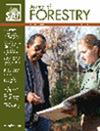Characterizing Community Forests in the United States
IF 1.8
3区 农林科学
Q2 FORESTRY
引用次数: 0
Abstract
Research on community forests (CFs), primarily governed and managed by local forest users in the United States, is limited, despite their growth in numbers over the past decade. We conducted a survey to inventory CFs in the United States and better understand their ownership and governance structures, management objectives, benefits, and financing. The ninety-eight CFs in our inventory are on private, public, and tribal lands. They had various ways of soliciting input from, or sharing decision-making authority with, local groups, organizations, and citizens. Recreation and environmental services were the most important management goals, but timber production occurred on more than two-thirds of CFs, contributing to income on many CFs, along with a diversity of other income sources to fund operations. We discuss the difficulties in creating a comprehensive CF inventory and typology given the diversity of models that exist, reflecting local social and environmental conditions and the bottom-up nature of community forestry in the United States. Study Implications: Despite their small footprint in the United States, community forests are a rapidly developing model of forest ownership, governance, and management that helps protect forestlands and open space and demonstrates how market and nonmarket forest goods and services can be produced for broad and enduring community benefits. This study inventories and characterizes community forests in the United States to increase understanding of this model, its prevalence, and its potential. It provides a baseline of information that serves as a foundation for further exploration and research on the impacts and contributions of community forests.美国社区森林的特点
社区森林 (CF) 主要由美国当地的森林使用者治理和管理,尽管在过去十年中社区森林的数量有所增加,但对社区森林的研究却十分有限。我们进行了一项调查,以清点美国的社区森林,更好地了解它们的所有权和治理结构、管理目标、效益和融资情况。我们盘点的 98 个 CF 位于私人、公共和部落土地上。它们以各种方式征求当地团体、组织和公民的意见,或与他们分享决策权。娱乐和环境服务是最重要的管理目标,但三分之二以上的 CFs 都有木材生产,这为许多 CFs 带来了收入,同时还为运营提供了多种其他收入来源。我们讨论了创建一个全面的社区林业清单和类型的困难,因为现有的模式多种多样,反映了当地的社会和环境条件以及美国社区林业自下而上的性质。研究意义:尽管社区森林在美国的足迹很小,但它是一种快速发展的森林所有权、治理和管理模式,有助于保护林地和开放空间,并展示了如何生产市场和非市场的森林产品和服务,从而为社区带来广泛而持久的利益。本研究对美国的社区森林进行了清查和特征描述,以加深对这一模式、其普遍性及其潜力的了解。它提供了一个信息基线,为进一步探索和研究社区森林的影响和贡献奠定了基础。
本文章由计算机程序翻译,如有差异,请以英文原文为准。
求助全文
约1分钟内获得全文
求助全文
来源期刊

Journal of Forestry
农林科学-林学
CiteScore
4.90
自引率
8.70%
发文量
45
审稿时长
>24 weeks
期刊介绍:
The Journal of Forestry is the most widely circulated scholarly forestry journal in the world. In print since 1902, the mission of the Journal of Forestry is to advance the profession of forestry by keeping forest management professionals informed about significant developments and ideas in the many facets of forestry. The Journal is published bimonthly: January, March, May, July, September, and November.
 求助内容:
求助内容: 应助结果提醒方式:
应助结果提醒方式:


